How Mitra Jyoti has been helping specially-abled people lead independent lives for 25 years
Madhu Singhal and her non-profit have been empowering visually impaired individuals with various programmes and material.
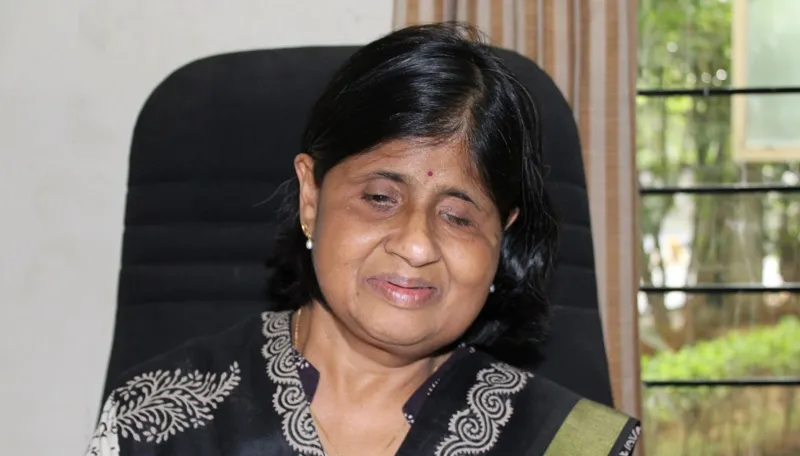
It’s a cloudy afternoon when I enter the green premises of Mitra Jyoti’s HSR Layout campus in Bengaluru. I first meet Sathya, one of the chief coordinators, who guides me to Madhu Singhal, the woman whose vision has helped Mitra Jyoti reach glorious heights in the past 27 years.
Fifty-eight-year-old Madhu greets me with an amiable smile and cautiously proceeds to give me a handshake. In a rather timid voice, she starts narrating me her growing up years in Haryana’s Rothak.
Fighting the odds to start off on her own
Madhu, who was born with a visual impairment, grew up in a large joint family of around 50-60 people. After being told to give up on any kind of medical intervention, her parents arranged for a teacher who home-schooled her about using braille.
It was only when I was 12 or 13, that the teacher insisted I was ready for regular school. Others students were not used to the idea of a visually-impaired child studying among them. So, I did surprise many people when I was trying to listen to the classes and making my own notes in braille, explains Madhu.
Recalling how she had to depend on various scribes to write her exams, Madhu says,
It was a nightmare if the scribe failed to turn up.” Growing up in the years when terms like ‘inclusion’ and ‘diversity’ were unheard of was no easy task. There were only a few academic subjects earmarked for visually-impaired people to excel in, explains Madhu, who also holds a Master’s degree in Hindustani Music.
Lack of inclusive infrastructure, educational resources, awareness and difficult family circumstances meant Madhu had to give up on her doctorate dreams. However, a chance visit to Bengaluru to see her sister opened up new avenues to Madhu, who remained in the city thereafter. Under the mentorship of her brother-in-law G.P.Goyal, Madhu registered the Mitra Jyoti trust in 1990, with a main focus “to provide social rehabilitation for people with disabilities, especially those with visually impairments.”
Initial hurdles
From humble beginnings in a garage to now housing South India’s first private braille press, Mitra Jyoti has marked an incredible journey. “We first started working in the slum areas around Audogudi, collecting information about the number of differently-abled people in each household. This was then followed by raising small funds and donations to help such people buy hearing aids to go through corrective surgeries. In just about a year, we had successfully managed to help people undergo 30-40 surgeries,” recounts Madhu.
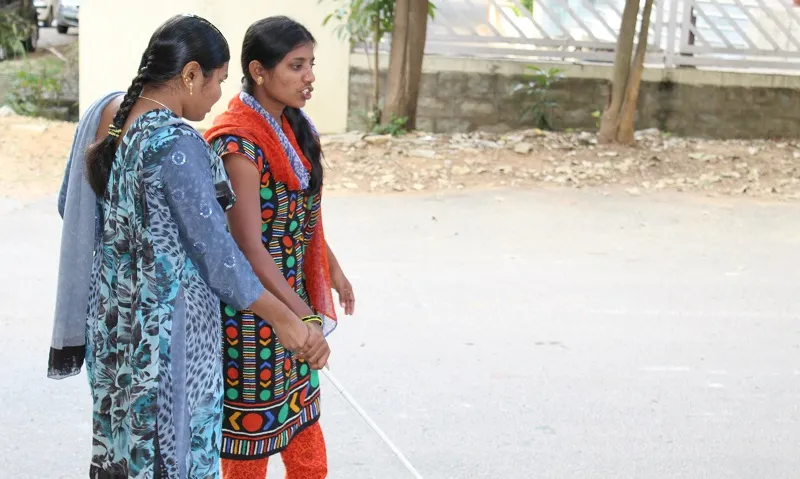
With increasing volunteer support, Mitra Jyoti also held garage sales of old items to keep their socially inclusive efforts going.
With the advent of audio, the nineties saw a sweeping change, with people depending on taped cassettes to listen to music. We utilised this technology to record books and started a ‘talking book library’ in 1992 where audio copies of various books were made and circulated. However, due to outside hindrances, these couldn’t be made in bulk. That’s when we rented a studio for this facility, narrates Madhu.
Empowering the visually challenged in more than many ways
Mitra Jyoti’s famous ‘talking book library’ now has a vast collection of around 3,800 books in CD/cassette format. I meet 55-year-old Gangadevi in one of the recording studios in the three-storeyed campus. She was engrossed in recording a Kannada book chronicling the life history of Swami Vivekananda. “I have been volunteering here for four years and I thoroughly enjoy recording audio books. I know my contribution is just a drop in the ocean but it’s an immensely satisfying experience,” she quips.
Mitra Jyoti also runs a full-fledged job placement cell that tries to bridge the gap between differently-abled job seekers and potential recruiters. Started in 1997, it has been placing visually-challenged students in various sectors like banking, manufacturing, and teaching.
At the arts and crafts training room I’m greeted with a cheery ‘hello’ from several visually-impaired women. Even as they converse with Satya, the hands of these women are busy weaving colourful baskets and square mats.
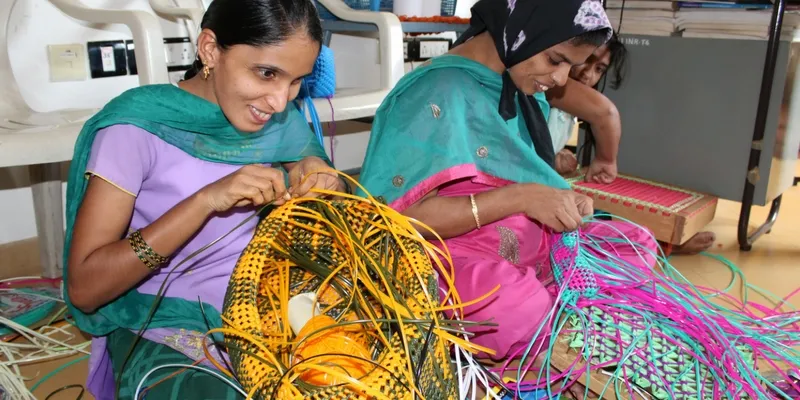
This class is part of our independent living skills training where we teach visually disabled girls about home management, mobility training, social and legal awareness” explains Satya, adding that, “this free residential programme is specifically targeted towards rural women who still face a lot of societal stigma for having been born with a disability.
Keeping up with changing technology
I then meet young Syed Mansoor Shahab who, Satya says, is among their celebrated computer teaching staff. It’s hard to notice Mansoor’s visual impairment as he swiftly navigates his keyboard explaining me how software like JAWS work.
Started in 2003, Mitra Jyoti runs specially designed courses to enable intensive training in basic and advanced computers for the visually challenged. The course, which charges a nominal Rs 1,000 per month is inclusive of lodging and also focusses on soft skill and employability training.
The centre has a newly acquired Braille Transcription Centre (BTC). I watch with a sense of awe the process of huge braille sheets being freshly minted. The BTC is equipped to provide braille copies of required books, tactile diagrams, school textbooks and even business cards.
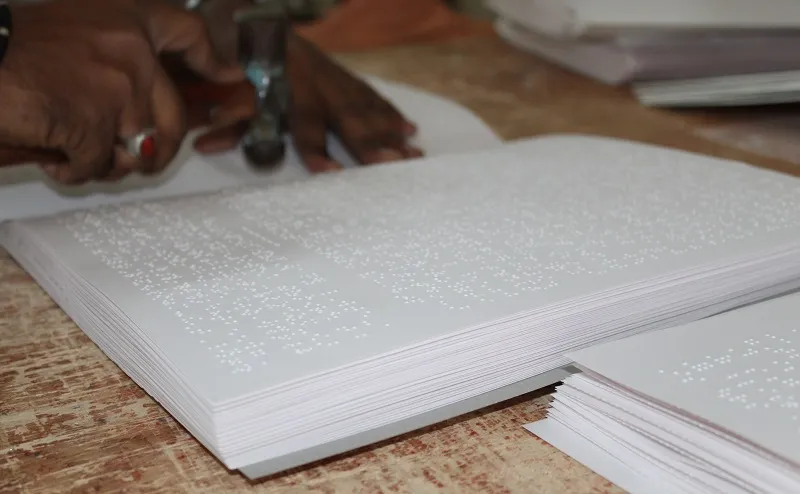
Madhu recounts how she hurriedly got off from an excursion to draft the project proposal requesting grants to set up the braille press:
I was on my way to Chennai when my dear friend called up and asked me to write a proposal within a day. I sternly declined and laughed at it first. However, I did get off midway at Vellore, came back and finished filing the proposal. As a result, we got a grant from the Ministry of Social Justice, Government of India and started operating from our own braille press in November, 2015.
Importance of a sustained and motivated approach towards inclusion
A keen and enthusiastic learner, a visibly thrilled Madhu says, “I learnt how to use Paytm yesterday”, adding that, “in the era of smartphones, everything is challenging for people like me in India. However, we strive to catch up”.
I ask her how it feels when she looks back at her silver jubilee journey of helping and empowering many differently-abled people like her,
From just reading about achievements of visually challenged people and getting inspired to starting a trust, from standing in queues to get a government plot allotted for the campus to running so many programmes that are helping people with disabilities, I must say it’s been a long and extraordinary journey, she says, with a smile of satisfaction spreading across her face.
As we bid goodbye, I ask her what was next for Mitra Jyoti. Madhu says, “We want to first strengthen the variety of programmes we are already running. Our future plans will depend upon various factors like our financial resources, bandwidth of resources and dedication”.
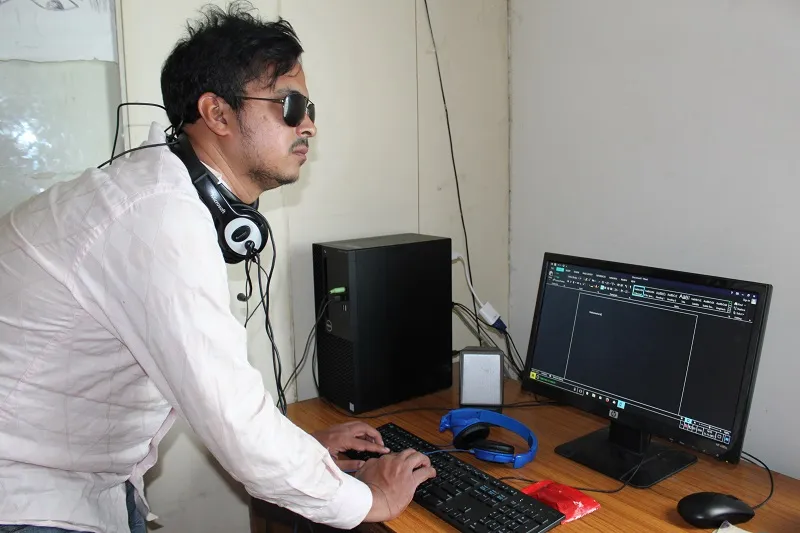
She also highlights the need for programmes and initiatives reaching rural India. “There’s a lot being done in big cities towards achieving a more inclusive and diverse society. But the impact needs to trickle down to the grassroots, to rural India where the real change matters. In this regard, only a sustained and motivated approach that truly understands the needs of people with disabilities will be fruitful,” Madhu signs off.







